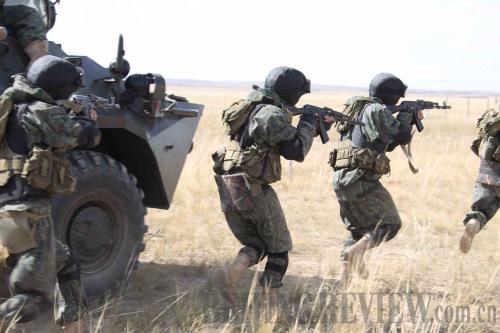|
 |
|
FORWARD: Kyrgyz special operations soldiers advance during the "Peace Mission 2010" joint antiterror drill on Matybulak Range in Kazakhstan on September 15 (WANG JIANMIN) |
Significance
Many Western analysts wondered whether the SCO is a regional military alliance, especially since it has held seven joint drills since 2003. But Chinese experts say the SCO is definitely not a military alliance, as indicated by the goals and name of the drills.
"The SCO is certainly not a military alliance. It is an organization established for regional cooperation," Feng said, noting that it is different from military alliances, such as NATO, because it does not have a military alliance treaty.
Moreover, China always stresses non-alignment in its foreign policy. The organization doesn't target any other countries, Feng said.
Chen Bingde, Chief of the General Staff of the PLA, said the drills were important in implementing the consensus reached by the heads of state of SCO countries. They significantly contributed to the countries' efforts to eliminate the "three evil forces," promote regional security and deepen SCO-wide cooperation, he said.
The "three evil forces" are threats to the international community, and Central Asia is an area that is home to many terrorist forces. The drills were mainly aimed at calming regional crises triggered by the "three evil forces," said Feng. Since 2007, they have been labeled as "peace mission," a name that also reflects their goals.
By launching joint military drills under the SCO framework, SCO countries can benefit in both military and political aspects, Feng said. From the military point of view, joint military exercises help improve antiterror battle command, coordination, logistics and operation methods. Politically, joint exercises, which represent the highest level of military cooperation, help strengthen international military cooperation.
For China, the drills offer opportunities to showcase the PLA as a defender of peace on an international stage, he said. They help enhance the PLA's military transparency, promote its coordination ability with foreign military forces and improve its competence by learning from the military forces of other countries.
Chen Jianmin said the drills can make the SCO and its members more capable of coping with non-traditional security threats. Other SCO members, including China, can learn a lot from Russia on controlling terrorism, he said. Since the Cold War, Russia has had a good deal of practical experience fighting terror, maintaining stability and dealing with terrorist attacks.
He believes that, in addition to training troops and promoting communication with foreign troops on military training and military theories, the drills were also a chance to demonstrate the PLA's open attitude toward the world. "China is an active participant in these SCO antiterror drills," he said.
A stable and peaceful Central Asia will benefit all nations in the region, said Chen Yurong, a research fellow with the China Institute of International Studies. For example, peace and stability in Central Asia are of great significance to the economic development in China's western region.
In addition to deepening security cooperation, promoting economic development and prosperity of its members is also at the top of the SCO's agenda, she said. The military exercises can deter the "three evil forces" in the region and help create a peaceful environment for political and social stability in Central Asia. | 